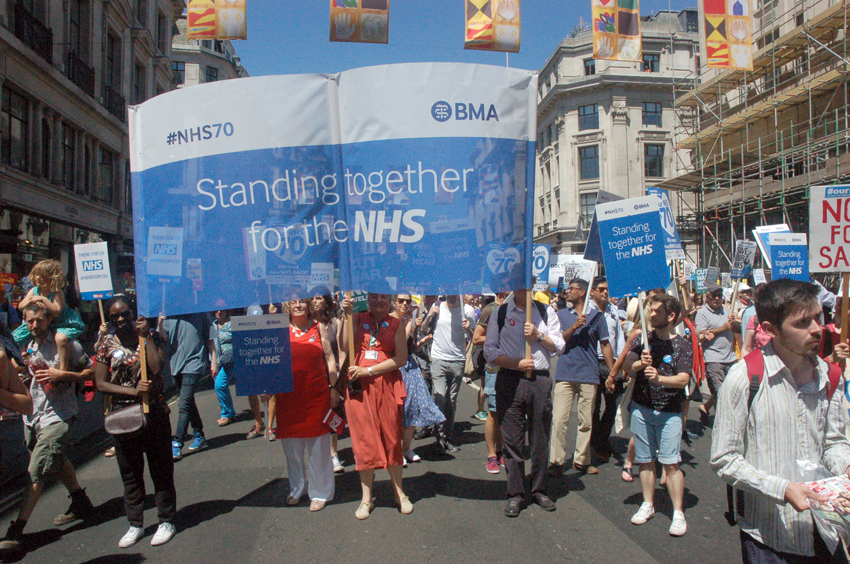
THE TORY government turned its fire onto GPs yesterday provoking an angry response from the trade unions.
Under new measures announced yesterday GPs will be forced to engage in face-to-face consultations with patients or face being made to merge with other GP surgeries. The new measures were billed as a means to ‘name and shame’ GP surgeries.
The GP arm of doctor’s union the British Medical Association (BMA) said that GPs are under severe pressure after a decade of funding cuts meaning that they are so short staffed that face-to-face consultations with every patient is not currently possible.
The measures come as part of a £250m ‘package of support’ for general practice announced yesterday, which aims to ‘increase the proportion of appointments delivered face-to-face’.
The £250m package is insufficient and ‘offers very little’ the BMA said yesterday.
Commissioners have been told to immediately begin identifying the 20% of practices in their area that are performing worst in terms of delivering face-to-face appointments, NHS England announced yesterday.
Practices identified as part of the exercise by integrated care systems (ICSs) may be forced to partner with other practices or face contractual action from commissioners, it added.
Setting out the details yesterday, NHS England said that all ICSs must start an ‘immediate exercise’ to identify any practices with overall appointment numbers lower than the ‘equivalent pre-pandemic months’ – excluding Covid vaccinations.
Its ‘plan for improving access for patients and supporting general practice’ said ICSs must also identify the 20% of practices with:
- The ‘lowest level of face-to-face GP appointments – as opposed to whole practice, including appointments with other staff’;
- The ‘most significant level of 111 calls from their patients during GP hours’;
- The ‘most significant rate of A&E attendances compared to what would be expected’.
Each ICS must submit the list for ‘immediate’ action – which is ‘unlikely to be more than 20% of all local practices’ – to NHS England by Thursday 28 October.
The plan said: ‘A wide variety of actions are likely to be required to resolve the issues: for example, to increase resilience, smaller practices offering unacceptable access may be expected to partner with other practices, federations or Primary Care Networks (PCNs), as an alternative to the application of contract sanctions and enforcement.’
Doctors union the British Medical Association (BMA) GP committee chair, Dr Richard Vautrey said: ‘After weeks of promising an “emergency package” to rescue general practice, we’re hugely dismayed that whilst additional funding has been promised, the package as a whole offers very little and shows a government completely out of touch with the scale of the crisis on the ground.
‘GPs and their teams will now be facing the worst winter for decades, and as a result, patients’ care will suffer. Appointments will be harder to book, waiting times will get longer, more of the profession could leave and GPs will struggle to cope.
‘It is also disappointing to see that there is no end in sight to the preoccupation with face-to-face appointments; we need a more intelligent conversation about the variety of appointments and care that are available to patients to meet their needs.
‘GPs across England will be truly horrified that this is being presented as a lifeline to general practice, when in reality it could sink the ship altogether. There can be no doubt that this lack of action at such a critical time will force many GPs to hang up their stethoscopes and leave the profession for the last time.’
Meanwhile, waiting lists have reached a record high with 5,025 people having to wait more than 12 hours to be treated in A&Es in England last month, NHS England said.
The figures, also released yesterday, come as the health service struggles to deal with a huge backlog in treatment caused by the Covid pandemic.
Dr Ian M Higginson, vice-chair of the Royal College of Emergency Medicine warned yesterday: ‘The NHS is thousands of consultants short, thousands of nurses short and also the professionals that help us run our departments such as HCAs, porters, receptionists, all those sorts of elements of the workforce need investing in and these are long term problems.
‘What we can do now is do our best to retain those members of staff who are still with us, whilst we are looking at the long term workforce solutions because at the moment we risk our workforce continuing to leave in ever increasing numbers making the problem even worse.’